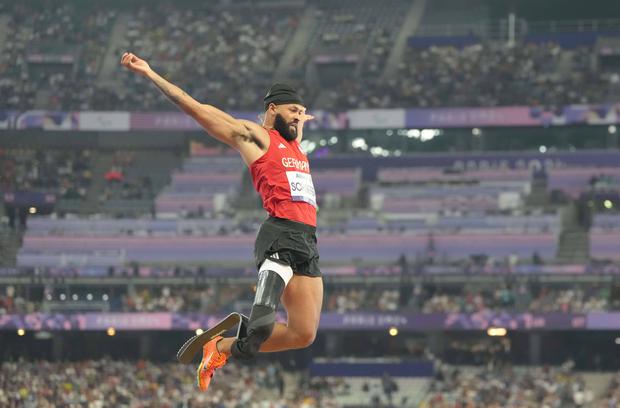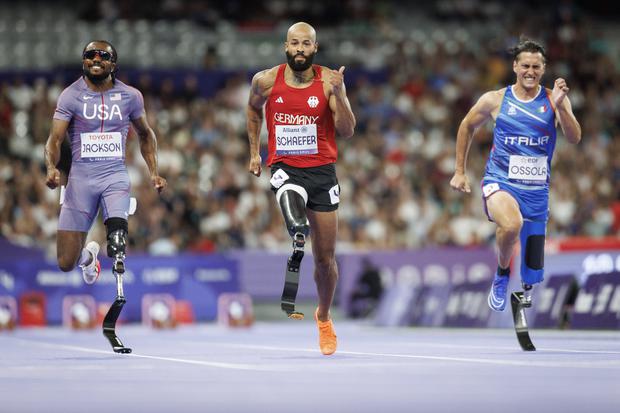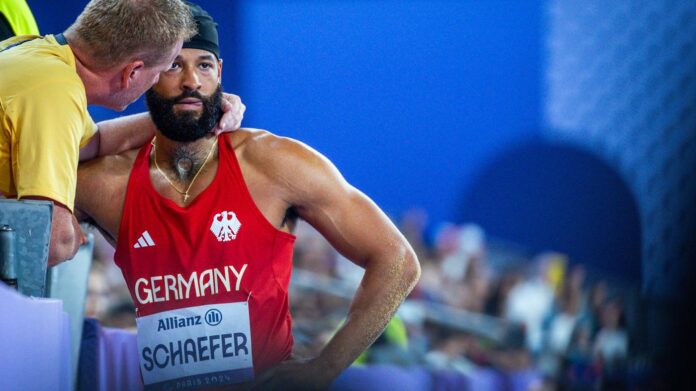Mr Schäfer, before the Paralympics in Paris You were considered a clear medal candidate – and then landed in the long jump and fourth place in the 100 metres. In addition to all the sporting disappointment – What does this actually mean for your income as an athlete?
Financially, I will definitely have to make a loss. By coming fourth, I will get no bonus from Sporthilfe, and not from my sponsor Nike. These are financial setbacks that I hadn’t really expected. Of course, this also has an impact on my progress. If I had the money, I would also have the opportunity to do certain things differently in training. Without the money, I now have fewer or worse opportunities.
You have been training at Bayer Leverkusen for over ten years. Will it stay that way?
A big point – which I don’t want to go into too much right now. I could imagine a change, but I have to see what options I have. Ending my career would also be an option, but that’s too difficult to predict at the moment. I just have to see whether I can even imagine putting another four years into it.
Are you unsure about participating in the 2028 Paralympics in Los Angeles?
I now have to wait and see how things develop in the near future. The important thing is that I start to enjoy the whole thing more. I don’t know exactly how, but it will be right to take a step back for now. I really want to plan my next steps so that I know exactly where I want to go. And I need time to make that conscious choice.
Are you thinking about taking a break from sports?
Definitely. Last year after the World Cup I only took a two-week break – and I’m noticing that now. Usually it was two or three months, so that I could get really excited about the sport again afterwards. I think the break that’s coming now will be more like that. The fun I’ve had in sport has waned this year. I put too much pressure on myself. It’s important to get the fun back. I’ll have to see how I can do that.
Considering my performance, Paris is another step backwards from Tokyo.
Leon Schäfer about his disappointments at the Paralympics
You emphasize your mental strength in many conversations. What condition are you in right now?
After the race on Monday evening and the following day, it was difficult. From a sporting perspective, I don’t know if I’ve ever had a defeat like this before. I had cancer, which is definitely not comparable to this. So I don’t know how to weigh this too heavily. It’s still difficult. The defeats are meant to show me something. I just don’t know what yet.
What strategies and plans do you have to deal with what you have experienced?
I write a lot and put my thoughts on paper to understand the whole thing in a different way. That will help me, as will a change of location and hopefully a vacation soon. I hope that this will give me more distance from the situation.
Directly after the 100-meter final you said that you didn’t fully understand the race. Looking back a few days, what didn’t go the way you wanted?
My start to the race was good. But then I couldn’t build up enough pressure to reach my top speed. When I realized that I wasn’t pulling away, it was already too late. I started to tense up and took too small steps. On top of that, the race the day before (the preliminary round, editor’s note) was so good and so relaxed that I perhaps felt too confident. I thought I just had to do a little more and I would easily win gold.
It was a close call for the medal positions. Does a photo finish make the result more difficult to grasp?
Definitely. Third place was only two hundredths away. Bronze would have been a little better for me, but I wouldn’t have been happy with that.

© IMAGO/ZUMA Press Wire
How did the evening after the race go for you?
I went out for something to eat with my family. Then I went to the Paralympic Village alone. I could hardly sleep. I spent the whole time trying to understand, analyse and reflect. Which is of course difficult when you are still so emotionally involved in the situation. My head just wouldn’t stop. I have now drawn my conclusions and accepted the situation.

© IMAGO/Beautiful Sports
Does it help you to talk to your teammates?
My teammates are not the people I talk to about it. Friends and family are more likely. It helps me to talk about what happened. Talking helps me reflect on it in the same moment. Spending time with my family was also more of a distraction for me. I’ll be thinking about it a lot over the next few days.
You also left the Paralympics in Tokyo 2021 rather disappointed. Do you now associate negative feelings with the Summer Games?
I can definitely differentiate my performance from the overall experience of the Paralympics. The experience is still a great one – being here, with all the different nations. In terms of performance, however, the two games were definitely not what I had imagined. If you look at my performance, Paris is another step back from Tokyo.
In the hot phase of preparation for Paris, you made changes to your prosthesis. Looking back, was that a mistake?
I tried a harder spring, which was the plan anyway after the World Championships in Japan (Schäfer won the title in mid-May, editor’s note). However, an injury prevented me from doing so. We initially concentrated on the sole, but then spontaneously changed the spring. There were too many changes, so I couldn’t find any consistency. But the Dutchman (Paralympic champion Joel de Jong, editor’s note) shows with his distances that this is the right way to go.
Recently, your world record in the long jump was improved by over 40 centimeters. Is this the technological advance that makes such big leaps in performance possible in such a short time?
That’s our sport. We have an aid, the prosthesis, with which we play the sport. In the case of the Dutchman: If you make a change and understand it and use it optimally, then you can improve your performance. I think that’s what makes our sport special.
Other nations seem to be catching up in para-sports. Can one say that the competition is getting stronger – and Germany has reached its performance limit?
I think the other nations are definitely being supported more. In Germany, you can’t normally make a living from sport alone. If you look at our premiums and then those of our neighbouring countries, then the competition goes home with significantly more. There is a lot of room for improvement in Germany. If we athletes also have to think about how we are going to make ends meet and study or work, it is logical that there is less time left for sport. If you have financial peace of mind, you can pursue sport with a completely different ease and effectiveness.
